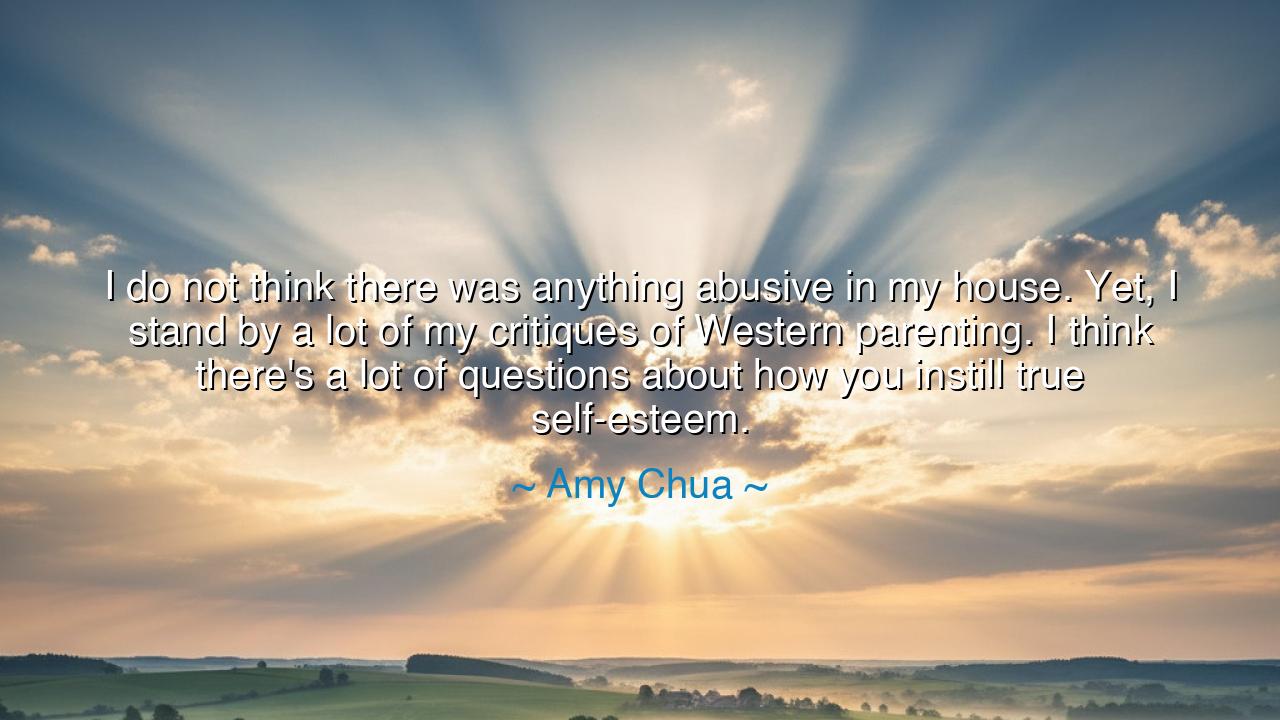
I do not think there was anything abusive in my house. Yet, I
I do not think there was anything abusive in my house. Yet, I stand by a lot of my critiques of Western parenting. I think there's a lot of questions about how you instill true self-esteem.






Hear the voice of Amy Chua, spoken with fire and conviction: “I do not think there was anything abusive in my house. Yet, I stand by a lot of my critiques of Western parenting. I think there’s a lot of questions about how you instill true self-esteem.” In these words lies a deep challenge to the ways of our age, for she declares that love is not indulgence, that strength is not born of flattery, and that the building of a child’s heart requires more than soft words. Her reflection calls us to question what it means to raise children with true self-esteem, forged not in empty praise but in real achievement, discipline, and resilience.
From the earliest times, cultures have wrestled with the question of how to shape the young. Some favored sternness, others gentleness. The East often exalted duty, rigor, and honor, while the West, especially in modern times, turned toward freedom, choice, and affirmation. Chua stands between these worlds, defending the strictness of her own upbringing against charges of harshness, while pointing out that Western softness often fails to prepare children for the demands of life. She speaks to the ancient paradox: how do we raise children to believe in themselves without deceiving them?
For what is self-esteem if it is built on nothing? To tell a child they are exceptional without effort is to build a house on sand. The winds of failure will come, the tides of rejection will rise, and the fragile structure will collapse. But to guide a child through struggle, to demand effort, to praise only when the work is true—this is to build a house on stone. The child may stumble, but their confidence will rest on reality, not illusion. This is Chua’s charge against Western parenting: that in offering constant praise, it may raise children who are fragile rather than strong, who mistake approval for worth, and crumble when life withholds applause.
History itself offers an example in the training of the Roman youth. A Roman boy was not told he was strong merely for being born; he was tested in discipline, learning rhetoric, arms, and endurance. Self-esteem was earned through deeds, through service, through conquest of self. When Rome raised her young in this way, she produced leaders, generals, and thinkers who could withstand hardship. Yet when indulgence and flattery overtook rigor, Rome’s sons became soft, and the empire decayed. Here, as Chua warns, lies the danger of mistaking comfort for growth.
And yet, her words are not without compassion. By saying “there was nothing abusive in my house,” she draws a boundary between firmness and cruelty. Discipline must never become abuse, nor must high expectations descend into tyranny. The task of the parent is to demand without demeaning, to correct without crushing, to hold the child to greatness while still giving them the assurance of love. Harshness without love destroys, indulgence without rigor weakens; but discipline joined with care produces not only achievement, but confidence rooted in truth.
The lesson, then, is clear: true self-esteem is not given, it is earned. It is built when a child struggles, falls, and rises again, learning that their worth is not in hollow praise, but in their ability to endure and to overcome. Parents must resist the temptation to protect their children from all discomfort or to flatter them without cause. Instead, they must stand as guides, showing their children that love does not mean exemption from effort, but the courage to face effort together.
Therefore, let every parent who hears these words take action: praise sparingly, but love deeply; demand effort, but offer support; teach your children that their worth is proven in resilience, not in indulgence. Show them that failure is not shameful, but the forge of strength. In doing so, you will give them a gift greater than comfort—you will give them the foundation of unshakable confidence.
Thus Amy Chua’s words, though controversial, carry the echo of ancient wisdom: self-esteem born of struggle is lasting, while self-esteem born of indulgence is fragile. To raise children with truth, not illusion, is to prepare them for the storms of life, so that when the winds rise, they stand not as fragile glass, but as tempered steel.






AAdministratorAdministrator
Welcome, honored guests. Please leave a comment, we will respond soon